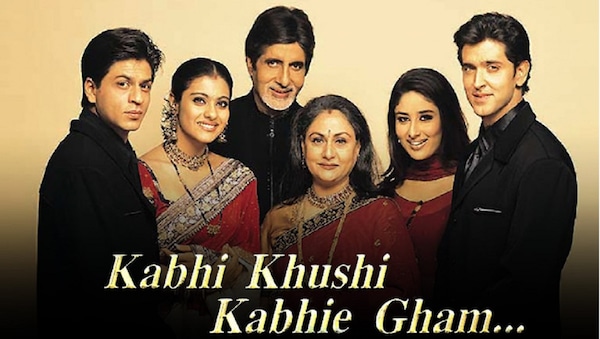20 Years of K3G: Revisiting Karan Johar's 'unapologetically' Bollywood masala fare that still works like comfort food
The mother of all multi-starrers, featuring Amitabh Bachchan, Jaya Bachchan, Shah Rukh Khan, Hrithik Roshan, Kajol and Kareena Kapoor, is a reminder of simpler times in Bollywood when films were designed like a celebration and unabashedly over-the-top

Last Updated: 12.05 PM, Dec 14, 2021
From enjoying films as an escape mechanism to the extent of judging someone for the films they watch, a lot about the movie-going generation has changed with time. In the social media age, it has become easier/convenient to write off films made in the bygone era over 280 characters, diss them for being old school, bash their supposedly 'problematic' messaging. A film needs to be called out for its problems any given day, no doubt, but what's equally important is to understand the audience for which it was made.
Not all films are meant to age like fine wine; some only serve the purpose of catering to the times and the tastes of movie-going crowds of that era. Storytelling evolves, trends change and what better example than Kabhie Khushi Kabhie Gham to represent Bollywood in its unabashed, funky 2000s? A one-film old Karan Johar, right after Kuch Kuch Hota Hai, inching to go beyond the 'one-film-wonder' tag, a family entertainer comprising a star cast that would make any Hindi film distributor go berserk.
It's exactly the stuff that big-screen experiences are made of. For the uninitiated, K3G is the story of how Rohan Raichand (Hrithik Roshan), the younger son in the Raichand family, helps his parents reunite with his elder brother Rahul Raichand (Shah Rukh Khan) after years of separation. The story goes back in time to discuss how special Rahul is, to the family and the circumstances that force him to cut ties with them.
The result is an 'epic' marriage of Hindi cinema's yesteryear tropes with the madness of the hep 2000s on a grand canvas. K3G is a story of two brothers - one adopted and one own. It's also a story of bruised egos where the conflict is between tradition and free will. One can term it Karan Johar's musical ode (and a fashionable upgrade) to the brand of cinema he possibly grew up watching in the 70s and 80s.
Beyond the showy visual aesthetics that the filmmaker is always known for, it's Kabhi Khushi Kabhie Gham's solid emotional foundation that resonates even today. K3G knows when to push the melodrama meter upwards, move on to frivolous humour, drift towards a dream sequence, discuss desh bhakti and let the story progress. Not many give Karan Johar enough credit for handling the film's drastic change in tones quite seamlessly.
Each of the leads is an exaggerated version of stock characters - Amitabh is the typical patriarch and an epitome of tradition, Jaya Bachchan is the generous mother whose heart always bats for the child but can't go beyond her 'pati dev', Shahrukh is the incorrigible flirt, Kajol is the over-enthusiastic, dramatic wife, Hrithik is the do-gooder and of course, Kareena is the spoilt teenager who thinks too highly of herself.
Not many may get the fact that cliches/stereotypes are not always bad for a film - it lends the story familiarity and draws you towards their ambience immediately. You can't intellectualise a scene where a sentimental mother can recognise the arrival of her son purely by instinct in the middle of a puja - you just buy that trope and enjoy it what for it is.
Unlike Karan Johar in the later decades where he became too conscious of his craft and brand, K3G comes with an unmistakable innocence and simplicity. Watch the scene where SRK calls Kajol 'sexy' in the second hour and you'll know what we're discussing. He pulls off a Poo, who rates men based on their appearance, without seeming regressive. He uses a tongue twister like 'Chandu ke chacha ne' to ensure recall value to a relationship.
Also, there are very few filmmakers who respect the situational value of a song and gives them a great cinematic culmination as well as Karan Johar. For those who debate that songs are a mere distraction from the plot and a commercial tool to sell the film, what can match the joy of Kajol shyly running away from SRK (while gradually falling in love with him) in the narrow lanes of Chandni Chowk and the scene shifting to a Suraj Hua Madham amid the Egyptian pyramids?
K3G still works like a well-packaged thali. It has your tummy full, it's a film where there's something for everyone and is designed to be a spectacle. From party numbers to foreign locales to old-school romance to frivolous (yet inoffensive) humour and melodrama, it's a near-perfect advertisement for Hindi cinema.
For a millennial, Kabhi Khushi Kabhie Gham may be just another hit film, but for the 80s,90s kids, it's a reminder of SRK's magnetic charm in the 90s, Hrithik's exuberance (or shall we say swag?) in his early years, Amitabh's graceful transition from his days as an angry young man, Jatin-Lalit's memorable album and an emerging director (Karan Johar), who turned out to be a spiritual successor to Yash Chopra.

